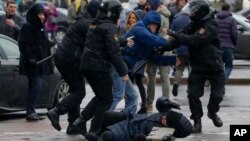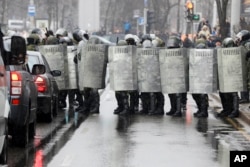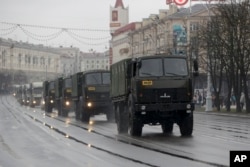Riot police in Belarus launched a massive crackdown Saturday on protesters trying to hold a banned march in Minsk. Hundreds were reported arrested, and a human rights leader said many of the detainees had been beaten by police and needed medical attention.
An estimated 700 people were trying to march through a central part of the capital, part of a wave of anti-government protests against a new tax on workers. Truckloads of police intercepted the protesters and attacked them with clubs.
Witnesses said unarmed civilians also were assaulted, and a Reuters reporter said at least 10 journalists were arrested.
Earlier Saturday, officials from the opposition group Vesna-96 said police had raided their headquarters in the capital and detained about 60 activists. All were later released, and there was no official comment on the incident.
Earlier this week, Belarus' authoritarian president, Aleksandr Lukashenko, said dozens of militants planning an "armed provocation" had been arrested in Minsk and elsewhere in the former Soviet republic.
Lukashenko claims conspiracy
Lukashenko, who has been in power in Minsk since 1994, said the detained militants had undergone training in neighboring Ukraine and had been funded by Poland and Lithuania. Relations between Belarus and those two other neighboring, pro-Western states have been strained throughout Lukashenko's time in power.
Lukashenko offered no evidence to support his claim that protesters in his capital had been trained and funded by other nations, nor did he provide any details of the alleged plot.
Protesters in Belarus have been staging civil disobedience actions in reaction to a new labor law that forces citizens to pay the government the equivalent of $250 if they work less than six months in a year, or if they fail to register with state labor exchanges.
Belarus, a country of 9.4 million people, has been mired in recession since 2015. Many opponents of the unpopular tax say they are effectively being penalized by the same government that has failed to reduce unemployment.
Responding to mounting public pressure, Lukashenko suspended collection of the unemployment fee earlier this month, but protests have continued.







